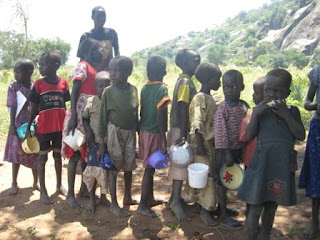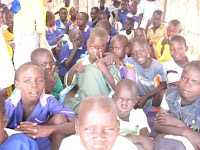 ECSS held a pastoral training last April. Two pastors/trainers from Kenya joined us. The training went very well, thank you.
ECSS held a pastoral training last April. Two pastors/trainers from Kenya joined us. The training went very well, thank you.
We think that training and equipping local Church leaders and evangelists prepares ECSS Churches for a long-term growth and provides a solid base of significant Church outreach in the future. We are planning to train evangelists, and Church leaders in evangelism, pastoral work, entrepreneurship and the methodology of Church planting. We also plan to hold various youth camps, conferences and seminars in different parts of Eastern Equatoria State, South Sudan. We need your prayer and participation in this crucial project!
ECSS is seeing a large number of people come to Christ but not enough are trained to teach or disciple the new believers. Christian believers can be led into false doctrines. They need to have a greater impact on society. The church wants to get the best from those whose call is to preserve the Word and those whose call is to get the Word out. Your support can help ECSS to train more pastors.

In reality ECSS lacks trained pastors who are grounded in the Holy Scriptures, rooted in the Word, and able to apply the Word of God to the lives of people for their salvation and for their own, to the glory of God. Pastors will be able to teach and preach the truth of the faith in Christ with clarity and precision. They will be able to prepare to lead in worship centered in Word. ECSS lacks trained pastors who communicate effectively, reaching the heart and mind with the Word. Therefore ECSS needs support for training its pastors who will be competent preachers and teachers of the Gospel. Those pastors who will be trained from theological colleges need to be ready academically and have Biblical knowledge and understanding through prayers and a broad educational preparation.
ECSS needs trained pastors who are competent leaders in pastoral ministry. They will be able to integrate strong theology and pastoral practice. With a deep faith in God, a compassionate heart for people, and a gentle and peace loving spirit they are to serve the flocks and the lost by applying the Word of God to people they lead.

ECSS seeks for trained men and women whose faith is centered in Jesus Christ and is nourished regularly by the Word in public worship and by a disciplined devotional life both in and out. ECSS looks forward to its pastors to know the Holy Scriptures well, to be confidently Church leaders, and to apply the Word of God to contemporary contexts and culture. If trained, ECSS pastors will understand the culture and where it is headed, engaging societal issues theologically. These pastors will be prepared to give a defence to the truths of the Christian faith against competing spiritual claims and movements of world religions and secular beliefs. They will be sensitive to their culture and able effectively to serve peoples with a vast diversity of origins, education, family customs, social structures, and political values.
New believers expect pastors to encourage them, counsel them, mentor them, and teach them to live meaningful lives of service. Those who went to school need to explore their faith theologically to reflect on their service to church. They are in the mission field daily, and they to relate their faith to their daily service in family, church, work, and world. But due to lack of trained pastors, these sometimes do not work.

ECSS needs trained pastors to lead and manage the congregations to accomplish their mission and purpose. If pastors get trained we expect that ECSS pastors will work more effectively, able to work in team ministry and manage conflict in congregational life. They will be able to prepare, manage themselves personally, spiritually, and emotionally and be ready for the daily routines of the pastoral ministry. Working hand in hand with members who have skills and gifted in various areas, so that the congregations can be able to carry out their primary mission of saving souls. ECSS as a Church needs pastors to serve communities who do not have regular pastors. There is a growing demand for different approaches to pastoral work that offer adaptability, portability, and accessibility within our congregations in Southern Sudan. Your support can help ECSS to fulfill its dream by training its pastors.





























